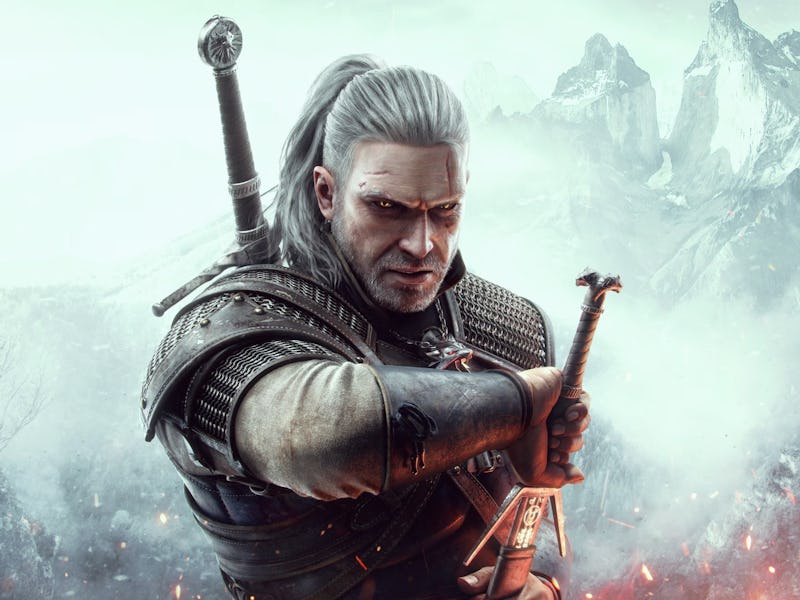PS Plus Just Quietly Added the Greatest Fantasy RPG Ever Made
Become the Witcher.

Every generation has that one game that ends up becoming the defining experience and pushes the entire medium forward — titles like Ocarina of Time and Resident Evil 4. The Witcher 3: Wild Hunt is one of the latest games to join that pantheon, a masterful fantasy RPG that legitimately revolutionized open world games. Few experiences are as gripping and immersive as The Witcher 3, giving you a grand fantasy world to explore, weighty player choices that shape the narrative, and a role-playing experience like no other. Now, one of the greatest RPGs ever is free for PlayStation Plus subscribers, so jump on it while you can.
Despite the number in the name, The Witcher 3 is actually the perfect place to jump into the series, as the game bakes in all the history and backstory you need. You play as Geralt of Rivia, a sort of mercenary crossed with a monster hunter called a Witcher. At the start of The Witcher 3, Geralt is on the hunt for his adopted daughter Ciri, who has a dangerously unique ability to jump between dimensions. As multiple powers search for Ciri, Geralt has to find her first to ensure not only her safety, but that of the entire world. While that’s the overarching story, The Witcher 3 is filled with smaller tales about taking down horrifying monsters, uncovering ancient history, and dealing with the nastier elements of human nature.
The Witcher 3’s world is astoundingly gorgeous, bristling with wildlife and color around every bend.
The Witcher 3 massively succeeds in two different areas: concise emotional storytelling and an expansive open world that feels living and breathing. While these two aspects shine on their own, the real brilliance is in how they constantly interweave and overlap. So many games have taken inspiration from The Witcher 3 over the last few years, from Assassin’s Creed Odyssey to Elden Ring.
There’s a huge emphasis on choice in The Witcher 3, taking a page from Mass Effect’s book. Geralt is his own character with a clearly defined personality, but there’s a lot of wiggle room in how his personality adapts to situations. The choices you make can drastically alter the main storyline, pieces of the world, and even the fate of major characters.
Even how Geralt acts around other characters can color Ciri’s relationship with him, like if you take payment from someone for finding her. Dozens of choices add up and mix together to define Geralt’s journey, and it’s now always obvious how something you do might influence events down the road, which is part of the fun. But a big way that The Witcher 3 tackles all this is by consistently surprising the player.
While Geralt is the star of the show, The Witcher 3 has no shortage of phenomenal characters, all of which get their own moments to shine.
Often times, small innocuous side quests in The Witcher 3 end up becoming wildly important featuring truly harrowing moral choices. One questline called The Bloody Baron, sees you taking a contract to hunt down a local lord’s wife, starting out deceptively simple before layering in huge but thoughtfully handled themes like domestic abuse, depression, and retribution.
These smaller stories and quests are brilliantly integrated into the open world and larger narrative. If you open your world map in The Witcher 3, you’ll see dozens upon dozens of icons to tackle — monster nests, bandit outposts, hidden treasure, and question marks for secrets.
Even the smallest quest or activity in The Witcher 3 can turn into something bigger, with some of the most harrowing and emotional moments packed into side content.
While there are plenty of gameplay activities to keep you busy for over a hundred hours, quite often you’ll take one of these activities, or a side quest, only to find it surprisingly leads to a much bigger quest, a piece of story that ties into the main game, or brand-new monster to hunt. A little quest to take down a few measly bandits can open up the opportunity to meet another notorious Witcher, who then plays into the main story down the road.
This is what made The Witcher 3 such an ingenious and seminal game — the way it dynamically tied its open world to the narrative, and constantly subverted the player’s expectations. Never knowing what direction a quest or activity might take made The Witcher’s world feel fantastically complex, like a real world that’s moving on its own, not just under the player’s influence.
The Witcher’s action combat feels fast and responsive, but also gives you a wealth of strategic options that include poisons, traps, bombs, and spells.
There are so many ways I could continue to wax poetic about the intricacies of The Witcher 3 — how reading codex entries on monsters tells you what potions and tonics to prepare, the rich detail to every location and town, the fantastically complex card game Gwent that takes center stage, the crunchy combat that gives you multiple spells and weapons to play around with, or the wide array of highly varied enemy types and monsters.
The Witcher 3 does nearly everything right, so much so that it’s almost impossible to imagine any way the final version could be improved. Over the years, the game has only gotten even better with continued updates, incredible expansions, and a host of new content. It’s a weird and wild world that blew away nearly every other open world RPG when it released, for good reason. Nine years after The Witcher 3’s release, other games are still trying to catch up.